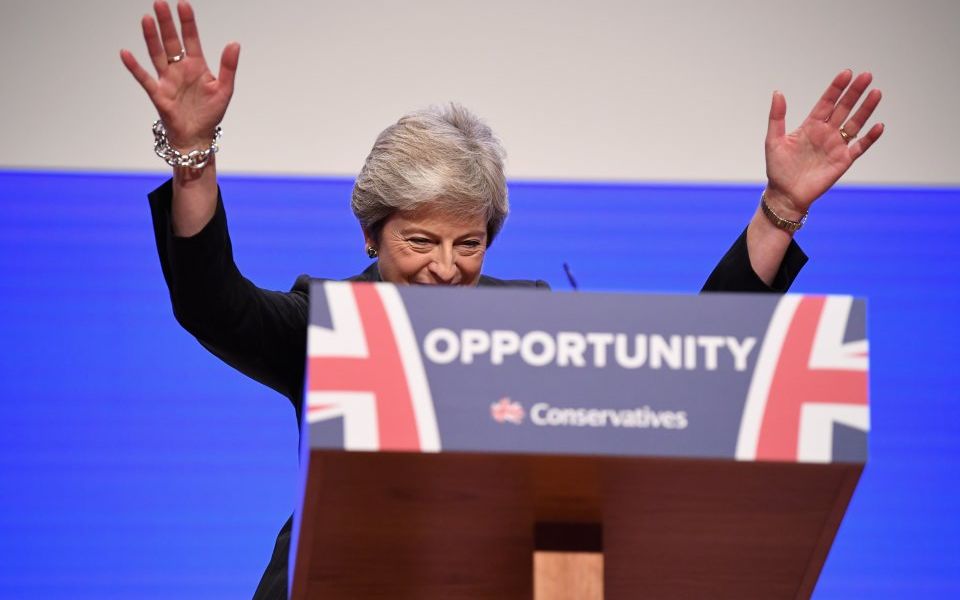The Conservative party conference was more SOS than Dancing Queen

You have to hand it to Theresa May: after last year’s conference fiasco, it took guts to go onstage yesterday jiving to Abba’s Dancing Queen.
In the end, her speech wasn’t bad. She has never been the kind of messiah-type figure who can bewitch a hall with her “authenticity” like Jeremy Corbyn, nor a charisma-soaked orator who inspires hour-long queues like Boris Johnson. But coughs and scenery disasters aside, she speaks well.
Moreover, her knack for self-deprecation is endearing to a British public eager to forgive anyone prepared to risk humiliation – remember the dramatic rehabilitation of former shadow chancellor Ed Balls when he learned to salsa on Strictly Come Dancing.
Read more: Business groups react to Theresa May’s conference speech
And on Wednesday, the Prime Minister was, if not exhilarating, firmly prime ministerial. “The Tories must be a party of everyone”, she announced. The subtext was clear: despite the whispers of mutiny and leadership contests, this is not a woman who has any intention of stepping down.
Style matter in politics. And while The Winner Takes It All might have been a more pointed message, Dancing Queen at least implies a leader determined for their reign to continue.
The problem, however, is one of substance. And that’s where May’s speech – and, indeed, the Conservative party conference as a whole – failed to deliver.
The Tories have been in government for eight years. Much of that has been dominated by austerity, whether real or perceived.
Now the polls show that the public has had enough, hence the renewed support for the high-spend agenda that Corbyn has transplanted directly from the 1970s.
And in response? Silence, dismissal, and an obsession with Brexit. The Conservative party, tangled as it is in internal battles over the EU, is belatedly realising that there is a gaping hole where a domestic policy vision ought to be. The panic over this policy vacuum was palpable, with MPs and party members wondering in hushed tones what their party now stands for.
Historically defined by their global outlook, Brexit has become such a sticking point for Conservatives that some events banned talk of “the B-word”, making it tricky to discuss Britain’s future with the rest of the world in anything but the broadest strokes.
The party wants to be a home for aspirational young working people, but the average age at which someone first votes Conservative is now 47, and the single most effective policy change – building more homes on the green belt to combat the housing crisis – remains anathema in the higher reaches of government.
And while it is traditionally the party of business, this particular government has stuck its fingers in its ears over the benefits of migration for the UK economy.
Even with that thorny issue put to one side, pro-market Tories would have been shocked to hear the debates raging on energy caps, regulation of the audit market, new digital taxes, and more corporate governance rules.
Capitalism, it has emerged, is no longer popular.
The question splitting the party at almost every event was whether the solution is a slow shuffle to the centre, or a radical return to its free-market roots.
Is it desirable or even possible to “out-Corbyn Corbyn”? For today’s Conservative party, this is just as much an existential crisis as the Brexit divisions.
Until they have an answer, the Tories will be unable to present an alternative to Corbynism – Labour’s policies might be disastrous, but there is power in its promise to fix a system that so many people feel is stacked against them, a promise to which the Tories have no unified response.
There are good ideas out there. One of the most compelling anti-Corbyn arguments of the conference came from MP Rishi Sunak. Labour’s flagship policy last week to give workers a share of equity from their companies was met with widespread acclaim from the left.
But, as Sunak pointed out, tell a 20-year-old founder of a new digital startup that the government will take a tenth of their company if their risk and energy and initiative pays off, and you’d get a very different response.
Is this argument being made outside Tory conference rooms? If so, it certainly isn’t resonating. And May’s rhetoric on Wednesday was more fluffy centrism than a full-throated defence of capitalism.
She’s pitching for the centre – a valid strategy if she can bring her party with her and follow through with policies to actually back it up. But there was little of that on display this week.
“We cannot make the case for capitalism if ordinary working people have no chance of owning capital,” May declared, shining a spotlight on the problem without offering a solution in anything but the vaguest terms.
And when it comes to winning over hearts and minds with the message that the economy can be made to work in your favour with just a bit more government intervention, Corbyn will beat May every time.
The Tories are in stasis, and this conference proved that they know it. Perhaps Abba’s SOS would have made a better soundtrack.
Read more: May and Boris were both in the shadow of Corbyn at the Tory conference